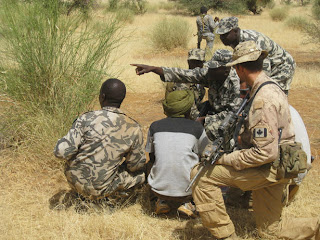Does the world watch Africa bleed once again and do nothing?
As much as Syria is a hodge podge of cold war interests, new country interests and players on both sides of the fence fighting for a word and for a piece of "good" media attention... the world once again forgets about Africa.......
Groups linked to al Qeada have taken over the northern end of the country and like their Taliban and al qeada brethren in their destruction of the famous Bayman Buddha statues they to are destroying historical relics, and shrines.......
Timbuktu once seen as the farthest place in the world and home to ancient texts is systematically being raped and pillaged.
 |
| Soldiers from Mali, trained by the Canadian Special Operations Regiment from CFB Petawawa, will be on the front lines in the fight against al Qaeda in Africa. |
OTTAWA — Canada is facing the possibility of being dragged into a new war against Islamic extremists as the situation in the West African nation of Mali quickly spirals towards chaos.
The Conservative government says Canada stands ready to provide support as calls for military intervention grew Thursday following reports militants linked to al-Qaida have taken sole possession of the northern half of the country.
Fears are mounting the jihadists will consolidate their gains into a base of operations from which they, and other terrorist groups, can launch further attacks across the region — and against Western targets, as well.
 |
| Canadian Special forces Soldiers training the Malian Commandos |
Such concerns have been the main argument for continued involvement in Afghanistan, where Canada will continue to deploy hundreds of military trainers until 2014.
Now there is a growing sense, bolstered by recent events in Mali and other countries across the Sahel — a belt spanning northern Africa from Sudan in the east to Senegal in the west — that the frontline against Islamic extremism has shifted.
“It’s a serious situation because it is the first time terrorists have taken root in important cities and could be in a situation to implant themselves in an entire country,” Reuters quoted French Foreign Minister Laurent Fabius as saying Thursday. “You have this risk . . . and threat that what is happening in northern Mali can happen in other areas.”
The United Nations Security Council has already condemned the violence and there are ongoing discussions about deploying an international force to counter the threat posed by the Islamists.
That force would be led by West African nations, the majority of whom are concerned about what would happen if the jihadists are allowed to regroup and then spread across the region. But there is an expectation Western nations like Canada would be asked to provide support in any number of forms, particularly given the vast amount of terrain involved, the absence of logistical bases, and the strength of the Islamic forces.
A spokesman for Foreign Affairs Minister John Baird said Canada is working with its partners to finds solutions to the crisis in Mali and “remains ready” to provide assistance to West African nations, in consultation with other partners, “once the needs for support have been defined.”
“Canada remains concerned by the deteriorating security and humanitarian situation in Mali, a country facing a political, security and humanitarian crisis,” spokesman Rick Roth added.
Canada is already no stranger to Mali.
 |
Like in Afghanistan, Canadian special forces troops helped train Malian government soldiers in small-unit tactics, communications, first aid and other military skills in recent years.
This came in the aftermath of the kidnapping of Canadian diplomats Robert Fowler and Louis Guay at the hands of the terrorist group al-Qaida in the Islamic Magreb, and in direct response to the growing threat of Islamic extremists.
Other Western nations have also been training armies in several countries throughout the region.
The former French colony has received hundreds of millions in international assistance from Canada over the past 40 years.
A model of stability and democracy for the rest of Africa, Mali remained an aid partner even after the Conservative government shifted its attention from the continent towards Latin America and the Caribbean.
“This was a country that went well, that was working well,” said Lucien Bradet, president of the Canadian Council on Africa. “Mali has always been in the good graces of Canada.”
But Canada’s training and development initiatives were suspended when a military coup ousted democratically elected President Amadou Toumani Toure in March.
OPTIONAL END
This created a power vacuum that was exploited by an alliance between separatist Tuaregs tribesman and the Islamists, who subsequently captured the north.
That alliance has shattered, and there were reports Thursday the last Tuareg bastion had fallen to the jihadists, giving them complete control over an area the size of France.
“This situation has become worse so much faster than anyone thought it would,” said Paul Hitschfeld, chair of the Ottawa-based Africa Study Group. “Now we’re starting to see an Islamic terrorist belt across the Sahel region. This is a slightly scary situation.”
lberthiaume@postmedia.com
Twitter:/leeberthiaume


No comments:
Post a Comment